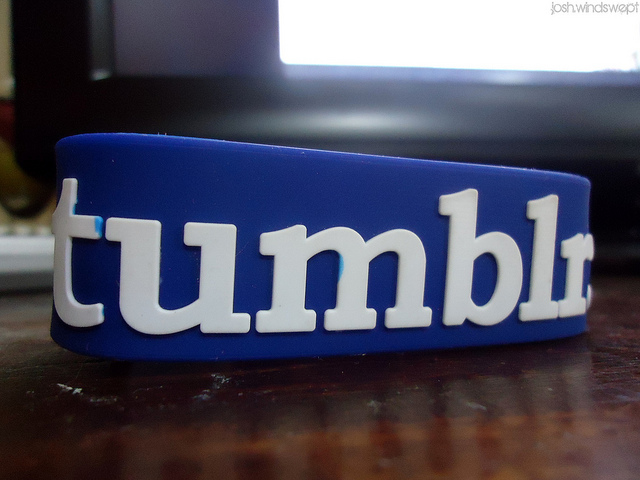
Even as many nonprofits take a relatively narrow view of their advocacy responsibilities, an article by Ken Yeung in VentureBeat examines the recent spate of tech corporations taking controversial positions, as modeled by Tumblr’s relationship with Planned Parenthood, which we covered last July. At the South × Southwest festival (SXSW) this week, the leaders of Planned Parenthood and Tumblr issued a joint statement calling on other tech companies to support the healthcare nonprofit, which remains firmly in the defunding sights of the GOP. But for Tumblr, the alliance is completely within brand and coherent with its business strategy.
“The third rail is changing,” chief brand officer Dawn Laguens of Planned Parenthood says. “The third rail used to be ‘companies should not get involved—they’re a blank canvas and should just do their business.’ Tech companies have changed companies. They have become personalities. They’re an expression of their users.”
“It’s time to take action in a show of support for this organization in their moment,” says Tumblr CEO and three-year Planned Parenthood board member David Karp. Planned Parenthood president Cecile Richards, in turn, lauds Tumblr, and also references the healthcare education work the nonprofit has done with companies like Google and the $1 million donation that Facebook Chief Operating Officer Sheryl Sandberg has made to the nonprofit. Of course, tech companies are not the only corporations to make themselves heard. Last year, in November, NPQ wrote about Hamdi Ulukaya of Chobani, who takes CSR to another level by integrating a change in organizational wealth-sharing practices with outspoken advocacy for refugees.
Laguens thinks that these days, silence on issues users find important creates problems in the bottom line: “If they remain a blank slate and have no values or point of view on the world, their users will abandon them. It’s a big shift in what we’re seeing in the world. People have higher expectations with companies.” And we have seen some evidence that this emergent culture is real, as when the #DeleteUber campaign took off during the first wave of response to Trump’s first executive order on immigration.
Victoria McCullough of Tumblr says, “We’re still thinking through a lot of this,” but declares that they now base decisions on whether the company can have a substantive impact in an important fight.
What we’re seeing now and why we feel so compelled to act with swiftness and again be a little more definitive on a certain issues, we do feel like [the president’s Executive Orders] are impacting a group that does not have a voice and does not have the political space to advocate for themselves.
Still, even though she admits some users may feel disenfranchised by the company’s more principled decisions, McCullough “feels confident that a majority of users that come to Tumblr, stay on Tumblr, and feel it’s a place to connect with one another because we do stand up for our values on the platform.”
“In the new world order,” Laguens says, “[companies] can be an open platform to do whatever you want, but [they] have become so prominent in this country as actors in this civic drama and have to step forward.”
Sign up for our free newsletters
Subscribe to NPQ's newsletters to have our top stories delivered directly to your inbox.
By signing up, you agree to our privacy policy and terms of use, and to receive messages from NPQ and our partners.
This year, Tumblr says it will advocate not only in defense of Planned Parenthood but also for LGBTQ equality, mental health, racial justice, and freedom of expression related to media protection and supporting net neutrality.
“We were focused on education last year and kept an eye on issues we could make an impact on. We’re not only about education, but moving users to a place where they can really expand their perspective on issues they didn’t know anything about or had different opinions on and learn from each other,” McCullough said. “We’re moving our users from being educated online to taking offline action—it’s about the long-term game here.”
“We felt that post-election, we saw from our community that did care about reproductive rights really fearing for the security of Planned Parenthood and saw community engagement around what’s at stake for [the organization]. It makes so much sense that the timing of our party really gave Tumblr an opportunity to step in,” McCullough said.
This is a 180° about-face for corporate philanthropy. In the past, most corporations would avoid controversy like the plague for fear it would turn off portions of their markets. Now, many see that the flipside to losing some customers is gaining others whose brand loyalties are connected to their values. As Laguens explained:
We got to know the people at Tumblr and were able to really think about how to reach a new generation, particularly around health and reproductive health information and we had started engaging on more of our caregiving, supporter, and activist side—what we’re seeing coming up. It was about how to reach young people and learn and listen to them on Tumblr as Planned Parenthood was building out its own apps and community.
Still, efforts of this kind are not representative of corporate philanthropy, the majority of which ranges from relatively superficial to ethically worrisome. Over the last few months, for example, we have written quite a bit about the questionable connections between pharmaceutical companies and patient advocacy groups. We’re interested in seeing how this trend toward corporations taking a chance on staking out a corporate values position grows.
Meanwhile, according to USA Today, tickets to Sunday’s Planned Parenthood rally were the hottest commodity at SXSW.











